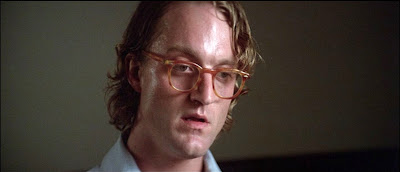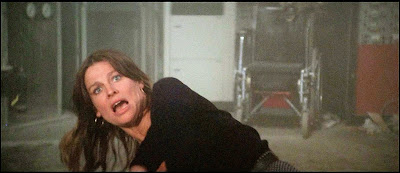I've a limited exposure to the British New Wave—that
post-war cultural movement in theater, literature, and film which propelled the lives
and concerns of working-class England to the forefront and ushered in the '60s vogue
for socially conscious kitchen-sink dramas like Look Back in Anger (1956) and Saturday Night and Sunday Morning (1960)—but of the few films I have seen, most have been distinguished by their decidedly testosterone-laden, male-centric perspective. So much so
that in a great many cases, the “Angry Young Man” genre description could just as well serve as a plot synopsis.
In these films, the leading men are depicted as a rebellious, restless bunch, ofttimes violently chafing at the constraints of the British class
system. Meanwhile, the women are largely portrayed as either fun-killing domestic
drudges standing as ball-and-chain obstacles to the hero’s independence, or
sexually available conquests whose troublesome biology (they do get pregnant
at the most inconvenient times!) brands them potentially dangerous anchors to a life of lower-class
squalor.
 |
| The "Honeyglow" Girl The ideal of the modern woman |
Not to discount Look Back in Anger in its entirety, but I loathed the passive roles played by Mary Ure and Claire Bloom. Ure’s submissive
doormat reminded me of nothing more than Wilma Flintstone as the browbeaten
housewife in the teleplay, The Frogmouth.
By contrast, I very much liked Simone Signoret’s worldly older woman in Room at the Top (1959) and Rachel
Roberts’ complex widow in This Sporting
Life (1963). But for all of their depth and dimensionality, neither character (tellingly, perhaps) came to
a particularly good end. It ultimately took doe-eyed Rita Tushingham in Tony Richardson’s
marvelous A Taste of Honey (1961) to provide a welcome change-of-pace from all this masculine disagreeableness shrouded
in societal disillusionment. In my narrow experience, Tushingham’s spirited
Manchester teen remained the lone feminine voice of the Brit-based genre until one day when I happened upon
John Schlesinger’s Billy Liar (1963)
and that force of nature known as Julie Christie.
Julie Christie’s entire role in Billy Liar can’t amount to
more than ten minutes of screen time, but as the easygoing, independent-minded
Liz (a girl so unlike the other clingy, provincial, ready-to-wed women in the film as
to be another species of being), Christie emerged the only one I even remembered. The frank simplicity of her performance, coupled with her refreshingly
open, guileless glamour, proved to be something of a bellwether moment in the
British New Wave. A turning point of sorts, in the evolution of women in British
cinema. Come the mid-'60s, the reversal of England’s post-war economic decline signaled a gradual
abandonment of these sparse and spartan tales of social oppression. Instead, Northern England’s
working-class suburbs were replaced by the burgeoning mod scene of swinging London, and the by-now familiar class rebellion commentary gave way to observant social satires taking pot shots at provincialism, consumerism, and the emergent dominance of youth culture.
 |
| Julie Christie as Diana Scott |
 |
| Dirk Bogarde as Robert Gold |
 |
| Laurence Harvey as Miles Brand |
 |
| Roland Curram as Malcolm |
WHAT I LOVE ABOUT THIS FILM
Perhaps because of all the macho bullying behind so much of it, I’ve
never much warmed to the whole “Angry Young Man” genre. Angry Young Woman…now
that’s another matter. Only two films come to mind: the above-mentioned A Taste of Honey; and the
rarely-mentioned 1985 Meryl Streep drama, Plenty.
A film that, while not technically an
example of the genre, is a wonderful female-centric perspective of post-war
British disappointment.
There is no obvious Angry Young Woman in Darling, but there is something akin to rage at the center of what
is eating at the never-satisfied-for-a-moment Diana. You see it in today’s
films. Those romantic comedies where women are characterized by how much they
shop and the label of the clothes on their backs. The films where the women are
near perfect physical and intellectual specimens, yet their very "femaleness”
is a weakness that dooms them to relationships with doofus schlubs like Seth
Rogen. Those awful Sex and the City
films where the over-privileged girlfriends can’t stop complaining or bemoaning their first-world problems for a minute and just count their blessings…it’s the same thing (Indeed, Diana Scott would
fit right in with Carrie Bradshaw and her “I want it all, but I'm pretty sure I won't be fulfilled when I get it” tribeswomen).
 |
| Sexual liberation yields little more than serial dissatisfaction |
I don’t know about you, but when I see compulsive consumerism of the
sort engaged in by women in today’s films as some sort of empowering
birthright, I can’t help but feel there are some real hostilities and angers
being repressed and swallowed up in this obsession with fashion. I can’t believe
the battlefield of women’s liberation has become the local outlet store.
What I like about Darling is
how relentlessly it lampoons this culture we have fashioned for ourselves that
sells people ideas of "lifestyles" rather than encourages us to find an actual life. Like a
similar character played by Jacqueline Bisset in the 1970 film The Grasshopper, Christie’s Diana Scott
has been led to believe that “liberation” is a complete lack of ties to
anything. Even herself. As she flits from one dissatisfying situation to
another, it never dawns on her that she has been sold a prepackaged,
consumerist bill of goods as to what real freedom and happiness is. The chic
trappings of the swinging lifestyle promoted by mod London are chiefly
beneficial to the shopkeepers, stores, and businesses. For Diana, climbing the
ladder of upward mobility ultimately offers her nothing more than increasingly
sumptuous surroundings to feel desperately lonely in.
 |
| Having it All |
PERFORMANCES
I’m mad about everything in this film, but Darling is far from being the favorite film of many. Some find it
dated, others complain of the satire being too heavy-handed; even the late John
Schlesinger stated in later years “(Darling)
seemed altogether too pleased with itself” and claimed his film was guilty of
“epigrammatic dialog” that came off as self-consciously hip. Where all opinions converge and most everyone is in agreement (even Schlesinger) is on the topic of Julie Christie's star-making performance. So natural a presence that the film takes on the feel of documentary whenever
she’s onscreen. You can't take your eyes off of her.
 |
| I've always wondered if the career of popular '60s British actress Judy Geeson (To Sir, With Love, Bersek) was either plagued or assisted by her more-than-passing resemblance to Julie Christie |
An entire generation fell in love with Christie because of this film
and it’s not hard to see why. In this her Oscar-winning role, Christie exhibits
that appealingly straightforward quality that would characterize her entire
career. She displays an incredible range and finds the humanity and humor in a
character not exactly likable. It’s always interesting when a smart actor
plays a not-very-bright character. Christie doesn’t condescend in her portrayal
of the shallow Diana. She conveys the character’s intellect in terms of a keen,
almost animal awareness of knowing which way the wind is blowing and shifting
her sights accordingly. Julie Christie is just a marvel here and endlessly
resourceful in getting us to know more about a character who knows absolutely nothing
about herself.
THE STUFF OF FANTASY
In films with lead actresses as talented and drop-dead gorgeous as
Julie Christie, it's not uncommon for the male characters to fade into the
background. Not so with Darling. In
fact, I can’t think of a film with a more solid, impressive, and eye-pleasing
male cast. As a nice change of pace, the men in the cast are, by and large, more
sensitive and emotionally needy than the heroine. Few actors have combined
suave masculinity with vulnerable sensitivity as persuasively as Dirk Bogarde.
As television reporter Robert Gold, Bogarde’s grounded sincerity (so easily
read in his expressive eyes) casts a by-contrast harsh light on the frivolous
affections of Christie’s Diana.
 |
| Diana (Christie) allows her vulnerabilities to show with her friend Malcolm (Roland Curram) |
Of course, the terrific Laurence Harvey (a delight in 1959s Expresso Bongo) makes for a rakishly
reptilian—and surprisingly sexy—competitor for Diana’s affections, but Roland Curram in the role of Diana’s photographer
friend, Malcolm, really made me sit up and take notice when I first saw Darling. For not only is the
character of Malcolm funny, handsome, and a good friend, but Malcolm is that rare
of rarities: a likable, non-tragic, non-campy, unapologetically sexual, gay
character. In a film made in 1965, no less! As the only genuinely decent
character in the film, his scenes with Christie are refreshingly convivial and
the only times her character ever appears to relax into herself.
 |
| Diana and her Gays Darling was one of the earliest films to depict gay characters in a sympathetic light |
Strangely, for a film with
such a progressive attitude towards homosexuality, it seems the
closets were full-to-bursting behind the scenes. Matinee idol Dirk Bogarde was
deeply closeted yet engaged in a brief fling with openly gay director John
Schlesinger during the making of Darling
(according to authorized Schlesinger biographer William J. Mann). Bogarde
enjoyed a 40-year relationship with his agent, Tony Forwood, but invested
considerable energy (throughout several autobiographies) in portraying himself
publicly as a heterosexual. John Schlesinger harbored hopes that his friend, Roland Curram, might be inspired enough by his role in Darling to come out of the
closet. Amused by his friend's presumption, Curram always insisted on his heterosexuality and went on to marry and
later sire two children. In 1985, on the occasion of his divorce and ultimate coming out
to his family and himself, Curram stated, “Of course, I told John later that he
was right.”
 |
| Unfaithfully Yours - Diana's twin deceptions Robert: "Your idea of fidelity is not having more than one man in bed at the same time" |
THE STUFF OF DREAMS
I first saw Darling in 1980,
by which time you’d think the film’s satirical slant would have lost its edge. That
at least would be expected. The scary (and sad) thing is that while the jabs have
lost their bite due to over-saturation, the chosen targets are nevertheless every
bit as wanting of lampooning today as they were in 1965. I find it uncanny that the social absurdities Darling poked fun at 52- years ago (TV commercials, fame whores, liberal
hypocrites, self-righteous homophobes, promiscuity for profit, the myth of “having
it all”, etc.) are still a prominent part of our pop-culture landscape.
Darling is the film that made stars of both Julie Christie and John Schlesinger. Schlesinger's next film would be his last with Christie; the big-budget adaptation of the Thomas Hardy novel, Far From the Madding Crowd (1967). After which he would go on to make the classics: Midnight Cowboy, Sunday, Bloody Sunday, and The Day of the Locust. Schlesinger passed away in 2003.
Julie Christie is a legend, of course, and the promise of Darling has been realized in film after film throughout her career. Few actresses get to become iconic stars; fewer still owe it all to introducing to the cinema a new image of womanhood. There are many remarkable actresses around, but there is only one Julie Christie...she is in a class by herself.
Copyright © Ken Anderson 2009 - 2012







.JPG)










.JPG)























